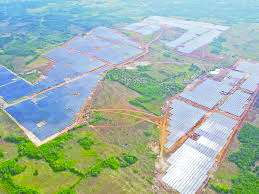ACEN Corp., the publicly-listed energy arm of the Ayala Group, has strengthened its presence in North Luzon’s renewable energy sector with the 133-megawatt (MW) Cagayan North Solar project in Lal-lo, Cagayan.
Developed in partnership with CleanTech Renewable Energy 4 Corp. (CleanTech), the solar farm is already supplying power to the Luzon grid, addressing the region’s increasing energy demands and advancing the Philippines’ energy transition.
The Cagayan North Solar project, the first utility-scale solar facility in Cagayan province, spans 115 hectares. It is projected to generate about 188 gigawatt-hours (GWh) of clean electricity annually, enough to power some 45,000 homes and offset approximately 128,000 metric tonnes of carbon emissions each year.
“Cagayan North Solar is the first renewable energy project in Cagayan supplying clean power to the Luzon grid,” said Eric Francia, ACEN president and chief executive.
“As demand for electricity continues to grow, this project plays a vital role in strengthening the country’s energy supply through reliable and sustainable generation,” he said.
Salvador Antonio Castro Jr., president and chief executive of CleanTech Global Renewables Inc., described the Cagayan North Solar power plant as “more than just an energy source; it is a symbol of progress.”
“By delivering clean, renewable electricity to the grid, it strengthens the Philippines’ energy resilience while reducing carbon emissions. For host communities, it means new jobs, better infrastructure, and a sustainable future. With every ray of sunlight captured, we illuminate lives and power a nation towards a greener tomorrow,” said Castro.
Beyond its environmental benefits, the Cagayan North Solar project is designed to create positive, lasting impacts for the communities in Lal-lo. During its construction, the project generated approximately 1,000 green jobs, stimulating local employment and economic activity in the province.
ACEN and CleanTech are also implementing community development programs in collaboration with the local government, focusing on improving access to education and public infrastructure. These initiatives include the 14 million Philippine pesos (P) construction of Bical National High School, the first high school in the remote village of Bical. It features four classrooms capable of accommodating up to 200 students.
To further support community well-being, the project has funded two multi-purpose gymnasiums in Barangay Magapit and Barangay Sta. Maria, with a total donation of P4 million. These facilities will serve as venues for local gatherings, sports activities, and emergency response efforts.
In times of disaster, the project partners have also provided timely assistance. In collaboration with Ayala Foundation, 500 relief bags were distributed to families affected by Typhoon Ofel in late 2024, underscoring ACEN’s commitment to building resilient communities.









